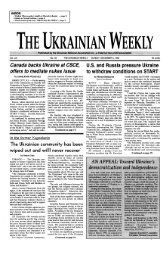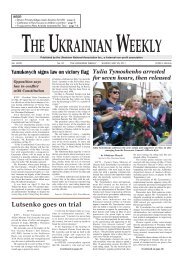1_January 6, 2002 - The Ukrainian Weekly
1_January 6, 2002 - The Ukrainian Weekly
1_January 6, 2002 - The Ukrainian Weekly
Create successful ePaper yourself
Turn your PDF publications into a flip-book with our unique Google optimized e-Paper software.
42 THE UKRAINIAN WEEKLY SUNDAY, JANUARY 6, <strong>2002</strong><br />
No. 1<br />
2001: THE YEAR IN REVIEW<br />
Andrew Nynka<br />
U.N. Undersecretary-General Kenzo Oshima rings the peace bell at the United Nations on April 26 to mark the<br />
15th anniversary of the Chornobyl nuclear disaster in Ukraine.<br />
Orthodox Church; Bohdan Khmelnytskyi; Josyf Slipyi<br />
(1892-1984), <strong>Ukrainian</strong> Catholic patriarch and cardinal;<br />
Ivan Franko; Leonid Kravchuk (1934- ), first president<br />
of Ukraine after its modern independence; and Stefan<br />
Bandera (1909-1959), nationalist, politician and ideologue<br />
of the Organization of <strong>Ukrainian</strong> Nationalists.<br />
• In October 1985, a <strong>Ukrainian</strong> sailor named<br />
Myroslav Medvid dove off the Soviet freighter Marshal<br />
Koniev in the port of New Orleans, seeking political<br />
asylum in the United States. Although the United States<br />
ultimately sent him back to the Soviet Union, the Rev.<br />
Myroslav Medvid, ordained a priest of the <strong>Ukrainian</strong><br />
Greek-Catholic Church in 1990, returned to the United<br />
States almost 16 years after his initial quest for asylum<br />
on the invitation of the <strong>Ukrainian</strong> Congress Committee<br />
of America (UCCA).<br />
Mr. Medvid met on <strong>January</strong> 30 with Sen. Jesse<br />
Helms (R-N.C.), chairman of the Senate Foreign<br />
Relations Committee, who had supported his cause by<br />
issuing a subpoena for Mr. Medvid to appear before the<br />
Senate Agricultural Committee, which the senator then<br />
chaired. He also met with former Pennsylvania Rep.<br />
Dan Ritter, and visited the <strong>Ukrainian</strong> communities in<br />
Philadelphia, Newark, New York, Chicago, Cleveland<br />
and Buffalo, as well as the <strong>Ukrainian</strong> Catholic diocese<br />
in Stamford, Conn.<br />
• President George W. Bush nominated Paula J.<br />
Dobriansky, an American of <strong>Ukrainian</strong> descent, for the<br />
position of undersecretary of state for global affairs on<br />
March 12. <strong>The</strong> Senate confirmed the nomination, putting<br />
Ms. Dobriansky at the helm of the office that coordinates<br />
U.S. foreign relations on a variety of global<br />
issues, including democracy, human rights and labor;<br />
environment, oceans and science; narcotics control and<br />
law enforcement; population refugees and migration;<br />
and women’s issues.<br />
Later, President Bush also appointed Ms. Dobriansky<br />
coordinator of Tibetan issues. <strong>The</strong> position was created<br />
by Congress to promote dialogue between the Chinese<br />
government in Beijing and the Dalai Lama, the exiled<br />
Tibetan leader, and to protect Tibetan identity. <strong>The</strong><br />
Chinese government has long expressed displeasure<br />
with the relationship between the United States and the<br />
Dalai Lama.<br />
• Nicholas Krawciw, major general, U.S. Army<br />
(retired), was honored at the 2001 Leadership<br />
Conference, held on October 19-21, with <strong>The</strong><br />
Washington Group Award for his efforts in promoting<br />
closer U.S.-Ukraine military ties. Gen. Krawciw is currently<br />
the president of the Dupuy Institute, a military<br />
history research center in MacLean, Va., and a consultant<br />
on Ukraine in the Office of the Assistant Secretary<br />
of Defense, International Security Policy (OASD-ISP).<br />
Over his 31 years of military service, Gen. Krawciw<br />
saw diverse assignments, from combat in Vietnam to a<br />
post as the senior U.S. observer and chief operations officer<br />
with the United Nations Truce Supervision<br />
Organization in and around Israel during the period of the<br />
Yom Kippur War. He amassed a long list of decorations<br />
over the years, including the Defense Distinguished<br />
Service Medal, the Army Distinguished Service Medal,<br />
three awards of the Silver Star, a Distinguished Flying<br />
Cross, two Legion of Merit awards, four Bronze Stars<br />
(two for valor), and a Purple Heart.<br />
• <strong>Ukrainian</strong> American World War II Flight Nurse<br />
Evelyn Kowalchuk was honored in Bedford, Va., at the<br />
D-Day Memorial dedication on June 6, attended by<br />
President George W. Bush. A native of Newark, N.J.,<br />
U.S. Army Air Corps 2nd Lt. Kowalchuk served 37<br />
years ago in the 818th Medical Evac Transport<br />
Squadron, logging numerous missions tending the<br />
wounded as they were evacuated to English hospitals<br />
from the beaches at Normandy.<br />
Mrs. Kowalchuk said of the wounded soldiers they<br />
picked up, “<strong>The</strong>y were scared. <strong>The</strong>y didn’t cry ... they<br />
were just glad to be on an American plane. <strong>The</strong>re was<br />
this one time I let a young soldier, who was bleeding to<br />
death, just rest his head in my lap while I sang him an<br />
old <strong>Ukrainian</strong> lullaby. He just needed to feel that closeness.”<br />
• In a commentary by Andrew Stuttaford published on<br />
May 15, the National Review Online, reprinted with permission<br />
in <strong>The</strong> <strong>Ukrainian</strong> <strong>Weekly</strong>, challenged <strong>The</strong> New<br />
York Times to remove Walter Duranty from its honor roll<br />
of Pulitzer Prize winners. Walter Duranty was a correspondent<br />
for the Times who reported on the situation in<br />
Stalin’s Soviet Union, praising the Stalinist regime and<br />
denying the existence of the <strong>Ukrainian</strong> famine of 1932-<br />
1933. While his work has been discredited and <strong>The</strong> New<br />
York Times itself has acknowledged that Duranty’s writing<br />
was “some of the worst reporting to appear in the<br />
newspaper,” he remains on the annual list of Pulitzer<br />
Prize winners published by the newspaper.<br />
• Twenty-two-year-old Connecticut-born Joseph<br />
Sywenkyj’s photographs of Chornobyl’s aftereffects<br />
were prominently displayed at the United Nations 10th<br />
Conference on “Health and the Environment” as an<br />
emotional reminder of the world’s worst civilian nuclear<br />
disaster.<br />
<strong>The</strong> Children of Chornobyl Relief Fund (CCRF) sent<br />
Mr. Sywenkyj, a summer intern, to capture on film the<br />
reality of the hospitals and orphanages affected by<br />
Chornobyl. Said Mr. Sywenkyj, “No matter what their<br />
condition, the minute I showed up it was something new<br />
for them. Something interesting. I think it broke up the<br />
monotony of their everyday routine. In general, most of<br />
the people were flattered and really happy about it. <strong>The</strong>y<br />
felt as though someone was paying attention to them.”<br />
• <strong>The</strong> tall ship Batkivschyna, a 90-foot schooner that<br />
set sail from Kyiv in April 1999 and participated in Op<br />
Sail 2000 in New London, Conn., spent the summer<br />
touring the United States, visiting Chicago for a celebration<br />
of Ukraine’s 10th anniversary of independence.<br />
Along the way, the ship visited Hartford and New<br />
Haven, Conn., and Albany and Utica, N.Y., and then<br />
entered the Great Lakes, with stops at Rochester,<br />
Buffalo, Cleveland Detroit, Bay City, Muskegon and<br />
Milwaukee. <strong>The</strong> Batkivschyna’s mission is to raise<br />
awareness of Ukraine and to raise funds for the<br />
Children of Chornobyl Relief Fund (CCRF). Capt.<br />
Dmitrii Birioukovitch, his nephew, his wife, and his<br />
crew will return to Ukraine after circumnavigating the<br />
globe by 2004.<br />
• In a solemn commemoration marking the 15th<br />
anniversary of the world’s worst nuclear disaster, the<br />
10th International Conference on Health and the<br />
Environment dedicated April 26 to re-evaluating the<br />
medical aftereffects and continuing illnesses that have<br />
plagued Ukraine, Russia and Belarus due to the nuclear<br />
fallout from Chornobyl. <strong>The</strong> session included government<br />
employees, physicians and scientists in the fields<br />
of nuclear energy, cancer research and pediatrics who<br />
emphasized the health impact the Chornobyl nuclear<br />
power plant catastrophe has had and will continue to<br />
have for future generations.<br />
• “Thousands of Roads,” an autobiographical account<br />
of the life of Maria Savchyn Pyskir, who lived under the<br />
pseudonym Marichka during World War II, was published<br />
this year. <strong>The</strong> book tells the story of Marichka’s<br />
involvement with the <strong>Ukrainian</strong> Insurgent Army (UPA)<br />
and her marriage to Orlan, an UPA leader. At one point,<br />
Marichka was forced to jump out a window and abandon<br />
her son to escape enemy capture. According to the<br />
book, Marichka defiantly told KGB interrogators, “You<br />
wish you had people who would dedicate themselves to<br />
communism the way we dedicated ourselves to our<br />
cause.”<br />
• “Enough,” a children’s book by Marsha Forchuk<br />
Skrypuch was released in March 2001 in the United<br />
States. <strong>The</strong> book describes how a fictional girl rescues<br />
Natalie Sluzar<br />
Nicholas Krawciw, major general of the U.S. Army<br />
(retired) was honored on October 20 with <strong>The</strong><br />
Washington Group Award for his efforts in promoting<br />
U.S.-Ukraine military ties.

















